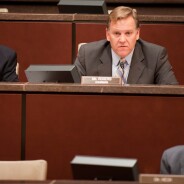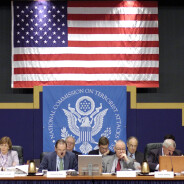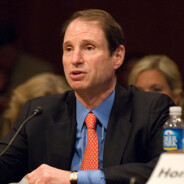Features
Interview: Rep. Mike Rogers – Full Transcript
As Chairman of the House Permanent Select Committee on Intelligence, Rep. Mike Rogers, R-Mich., has restored a measure of bipartisanship to a committee that was deeply divided by the George W. Bush years. The former FBI special agent faces the task of keeping the good will flowing even as he calls for repeal of Obamacare, criticizes the administration's handling of classified information and questions the adequacy of its intelligence approach to Syria. Rogers spoke with Ben Iannotta in his Capitol Hill office.
Iannotta: You've garnered real bipartisan success here. What's the secret to that?
Rogers: Acting in a bipartisan way.
How do you define that?
Well, I've tried to take all the edges out of the national security debate. So, sometimes there are issues that come up where people decide to be partisan for the very sake of being partisan. I try to remove all of those types of issues, building consensus early. Working with Democrats on my committee and take their suggestions, their offers, their amendments before it gets to the place where you're supposed to fight about things, so that we can have an honest debate about it. And I think being fair with them on their issues of concern, and trying to incorporate those issues, so that we have a better product – I think that is what has done that. And treating the intelligence community fairly. When they're wrong, we need to tell them they're wrong. When they're right we should not be bashful about telling them they're right. And we try to do all of that all at the same time.
How do you keep, how do you go out and push hard for something like repealing Obamacare without having that bleed over into your work on the committee, like Democrats taking that out on you?
Well, in this line of work, people do understand we're going to have differences of opinion. That's why you have Republicans and that's why you have Democrats. And so some of those issues are just natural areas where we are gonna strongly and passionately disagree. And I did this earlier on in this, where I used to work very well with Anna Eshoo on certain child pediatric device issues and we couldn't agree on certain intel issues. So we've learned, I think all the members have learned, it's a matter of mutual respect, and don’t short cheat anybody, if you do that, and you go into things, and say, 'Hey I'm going to disagree with you on this. This is an area or an issue where we're going to disagree on but I'd like to work it out – people get that. Again, as long as you follow through and you don't sneak up and try get somebody and you don't play gotcha, and you build relationships with folks who have differences of opinion – You know we still have a wide variety of opinions on that committee but we find a way to build consensus. And that's why, I think that make the difference where I'm out trying to repeal Obamacare today but we're working on very sensitive national security issues together the next day.
To plug leaks, are the expansions of polygraphing and the threat of going to jail going to be enough, or are you working on legislation?
There needs to be more than that, I think. I would argue that there has to be some moral leadership coming out of the White House as well.
You said more or moral?
Moral. They need to stand up and very aggressively take a stand on leaks. And I think the President can go a long way by being very forward leaning on this by saying, A, he won't tolerate it, but B he's going to welcome the investigation. All of his people will be made available at any time for interview with the authorities and they'll provide all of the documentation that they need and ask for without any negotiation. And I think that sends a very clear message. Now, he hasn't done that yet. He's nibbled at the edges. But that sends a very clear message that he will not tolerate leaks in his White House. That's an important thing. A lot of these steps we're taking to lock things down – polygraphs – apply to the intelligence community. There's a whole nother group of individuals that won't fall under those rules.
Meaning the political appointees?
People that – You know, National Security Council individuals and staff, and the folks who deal with that that come into a presidency and leave with a presidency.
Because it seems like the rule changes target the – that's probably not a nice word – focus on the – wait, I don't have to deal with euphemisms, I'm a journalist.
Exactly.
Anyway, they really sound like they target the working level people but the leaks, at least the way they've played out, sound like they're at higher levels.
That's correct. That's the challenge. And that's why we've been calling – yesterday I came out pretty strongly and called on the president to make his staff available at any time and to produce documents along with the staff making available, again, phone records and other things. And by the way, telling his staff to release those reporters from any obligation to keep their conversation confidential.
So the word leak, in your mind, does it always mean to a reporter. Or could it also mean somebody sharing information with somebody at another agency who maybe has a clearance but is not cleared into that particular issue.
Boy, if we started to get into the semantics of that kind of a working relationship discussion, I don't know if there would be many people left in the community. So, again, I argue, a leak is something that either becomes public that causes harm, it's a release of classified information to somebody who's not authorized to receive it, who does something with it that allows our adversaries to read it or to hear it. And both of those are unacceptable.
Last question in this area, and keep in mind it comes from a journalist's, I think, natural bias on this one. If Colleen Rowley had sent her memo about Moussaoui's flight training to the New York Times instead of [afterwards] to director Mueller, history might have played out differently. So are leaks always a bad thing?
When it comes to classified information, you cannot have individuals determining by what small piece of the world they see what should and should not be classified. That is a recipe for disaster. And there are lots of outlets. We have a whistleblower protection for a reason. They can come to a committee like the intelligence committee and offer up classified, sensitive information. It happens by the way, and we take every case that comes into our offices extremely seriously. And we will investigate them until we're either satisfied that it's getting justice within the system, or we'll take it out, without the system. So there are lots of outlets for that. Making something public that damages other things that that particular individual may have no knowledge of is wrong. And that's why we have compartmented information. You know, we have different levels of classification for information, and we have people read in to different degrees of all that information to try to protect it, and sources and methods. So when people do those kinds of things, they jeopardize more than the very small piece they may see.
I see. I see. So shifting gears on you. So Syria is obviously a huge issue. What are the early intelligence lessons you see?
I think the administration policy was slow to come around on doing something with Syria. And I think that has proven to be a mistake and will cause us some trouble moving forward when it comes to trying to understand who the opposition forces are – some 275 plus different groups have claimed opposition status to the Assad regime. Some 25 percent of those roughly have some ties to extremist organizations. And it just gets a little murky from there. And I think being slow on an event like this is just not helpful. And sometimes we just don't get to pick on our calendar when things happen. But we have to be willing to make hard, quick decisions to make sure we stay ahead of it. And I'm not talking about doing any action. I'm just talking about putting us in a position – us being the United States government – in a position to collect information that policy makers need to make good decisions. We're not just there yet.
So is there not good enough intelligence, though, to take a harder stand because you don't understand all these opposition groups.
Well, when you say harder stand, I'm not sure what that means. There's been a lot of calls for arming rebels and I have been opposed to that because I just don't believe we know enough.
Right, okay.
That to me is a great example of not having the appropriate intelligence to make a good decision. And we can, we should only make decisions on what we have a high degree of certainty that we know. As a policy maker, when you're talking about arming individuals to overthrow a government that's a big deal. It should be a big deal. And I just don't think we know enough. On that argument, I would say yes, we clearly don't have enough intelligence to make those kinds of decisions today.
Again, another topic, I saw your statement about William Webster's Fort Hood report. So what's the concern about having agents separate from analysts? And obviously I know you were a special agent.
Well, you know, in my days at the FBI, analysts really didn't even exist. And the case was run, investigated, and completed by an agent. And the value of an analyst is huge when you get to a complicated case of any degree. If you're running a bank robbery case, an agent can probably do those things very effectively. If you're running a fugitive case, you know they can be effective but an analyst would allow a better, a more effective investigation. You take a counter terrorism case, and as complicated as they are, an analyst is critical to a better conclusion quicker on those cases. So I think having those analysts together with the FBI are critically important because they can have a whole country purview. And sometimes an agent if they're in Chicago, they know Chicago issues. An analyst can help bring in information from across the country. The Crowley [sic.] case is a great example of that. If there had been an analyst on that case, who knows? They may have been able to pick up on some of the national hits where an agent might not have that ability because they're so focused on the leads in their particular division. And some of that happened in the Fort Hood shooting. And --
What I'm doing here, at C4ISR we didn’t really look at these issues, so I'm really trying to get up to speed. But so, in the FBI you've got agents out at field offices, and you've got the analysts off somewhere else, is that how it is?
In some cases. In this particular case they did that. And it was convoluted system here, because, and you had a little bit of lack of education on definitions I think hurt this case a little bit. Somebody thought information was sensitive and not for sharing, because of the way it was collected, and it was really just a simple mistake on how that happened. And so having everybody in the same room on the same sheet of music is a good thing. And there was clearly some indications that the Army was very reluctant to move forward. They thought that they would be punished for being maybe overly aggressive with someone based on their religious beliefs. And you know as an investigator, you can never do that. You have to be void of all of that. You have to take your leads where they take you. And that we need to make sure is implemented equally from the DoD side, the FBI side as we move forward.
And I notice when I read the unclassified version of the report it said that some people, or maybe it was person -- I'm not sure if it was more than one – wasn't aware of the existence of the DWS-EDMS data base, this database that had the emails in it. Is there a way that can be fixed or maybe it's not a big problem?
Yeah, it can be fixed. It's just, again, there was a lot of systems. You had two very different cultures trying to work in the same room. And so this is one of those culture clashes, especially when it comes to DoD and the language, the language they speak, even if you're about the same counterterrorism investigation is probably different.
I gotcha.
And so that was the trick. How do you merge those, A merge that culture if you will, and have a common language when you're talking about databases and other things for access.
I want to hit another area. On big data, lots of U.S. citizens assume that this means all their emails, their tweets, their social media are being collected somewhere and being parsed by the government. Is that true?
Not without a warrant they're not. If you're an average citizen, the government isn't willy nilly collecting it and sitting down and having a good laugh over your emails and your tweets. It's not happening. In order for them to access your information, they have to have a warrant in order to say, 'Hey, I'm going to look at Mike Rogers' emails for the next three months,' they have to go to a judge and prove that there is some reasonable belief that there is going to be a crime committed.
Is that a FISA judge or could be any judge?
Well, it could be, depending on what the violation is, it could be, you could be charged with a domestic crime, and that would be an article 3 judge. You could have a FISA judge if it is a, if it has an international flavor to it. So, there is all segment. And by the way, highly reviewed. We review it. The Department of Justice reviews it. The judges review FISAs, I think every, when I was in, it was 10 days, I think that's still amount of days. There's lots of reviews to make sure there's no abuse of people looking at information they shouldn't look at.
How's it looking for your cyber legislation?
Well, we're getting some movement in the Senate. I think that's good. If we can get something that isn't overly proscriptive, overly regulatory to a conference committee, I think we can probably work out details to get something to the president to [inaudible…vet?] this fall.
Do you expect a big fight on renewing the FISA amendments?
Umm, I think you're always going to see some scuffle over it. I think there's a difference between a big fight and a scuffle. I think you're going to see a scuffle. And most people realize, the information is overwhelming how successful and, just, no abuses of this particular law enforcement technique. And again, it's because we respect the fourth amendment due process and there is judiciary third party review of the collection of this information. And that's, at the end of the day, Americans don't mind if there is a legal, third party review to collect that information. It happens thousands and thousands of times a day across America with subpoenas and warrants, and that's the same thing we're implementing here.
On the cloud –
Spokeswoman Susan Phalen: One more
The administration has made these big claims about saving money by putting applications and data in the cloud. Do you believe those? Is there any way to analyze that to know?
We think we can analyze it. There is a small dissenting school of thought that says you can probably do it, but because of the classified nature of it, you may not save money from doing it. At least any time soon. So maybe over time you'll have a margin to save but I'm a little bit skeptical of the big number savings that they talk about. Merging systems, those kind of things, I think we do get big savings from IT. To try to condense our, the way things are pro — in other words, if you're sitting at a desk having five different systems, we just can't sustain that any more. So we're going to have some merger of IT and some consolidation and synergy of services when it comes to IT, that's great. Cloud? We're still working through the security protocols to make sure that this stuff is safe and secure, not accessible outside of the cloud itself. So that you don't have intrusions that are dangerous to national security. We have all of that to work through. But I do think we're probably going to have to get there. I think it's the wave of the future. And it does have some savings in its management of it that I think is valuable.
End transcript
OPINION: Risky Business
Threats To The U.S. Won't Go Away, Even If Funding Does
The U.S. intelligence community is not sufficiently funded to perform its mission, and now the community is staring at a 10 percent gouging in January, because Congress and the administration did not agree on a plan to reduce the debt. Ironically, the original intent of the sequester was not for it to happen. It was supposed to force members of Congress to work together to resolve the long term debt problem. The approach failed. Members of Congress remain unwilling to work together, and although members in both parties hope to avoid the budgetary reductions, no one is taking action to avoid them.
With this kind of leadership, we should all hope for change.
Setting aside the sequestration threat, there are many people who have accepted as a fait accompli, that the years of increasing intelligence budgets are over and that reductions are appropriate. I wonder if our adversaries will get the memo and kindly accommodate our financial plight by standing down their activities for a while. I wonder if our own leadership will recognize that the intelligence capabilities that we need are driven by the threats and the need to be able to provide our leadership ample warning and insight, so that they may be managed.
In the months after 9/11, the country witnessed true leadership. The political parties were united and Congress worked with the administration to ensure the nation rose to meet the challenges of a very uncertain time. Funding for a wide range of activities was increased to rebuild capabilities that had atrophied. Congress established bipartisan commissions – the House-Senate joint inquiry and the external 9/11 Commission – to ensure that we understood what happened and to make every effort to ensure that it never happens again. These examples of leadership gave the nation assurance and confidence.
During the years preceding 9/11, many people accepted the notion that the Cold War was over and that the need for intelligence was therefore greatly diminished. Talk of a Peace Dividend was common. Today’s corollary is a Debt Dividend: Agreeing to the notion that the nation should reduce intelligence funding in the name of contributing to debt reduction, without a fulsome discussion on the risks.
If we were to look at the threats today and what we expect our intelligence community to do about them, we would increase the funding levels despite the national priorities on the debt.
Part of the problem is that garnering political support for intelligence activities is inherently handicapped compared with other national priorities. The merits, costs and benefits of Medicare, Medicaid, social security, and federal spending on education can be quantified and discussed publicly in detail. We cannot have a public debate on intelligence activities because discussing the merits of any particular program would assist our adversaries in understanding our capabilities and then countering them. Furthermore, it's impossible to quantify the consequences of reducing our intelligence expenditures because we can't be sure what will or won't happen. So we place our trust in elected leaders to ensure that the rest of government has the resources and wherewithal to perform the missions that we expect. When it comes to preventing future acts of terrorism, we should not be so comfortable as to think reducing intelligence resources is a good idea.
A strong case can be made that the threats are continuing to grow and diversify and we are not prepared for the types of threats, the number and diversity of their origins, the increasing significance of consequences, and the difficulty in developing adequate intelligence on them.
In the good old days, all we had to worry about were invading armies and nuclear annihilation. Today, adversaries are content to affect our foreign policies. They try to do so by killing Americans (suicide bombers, IEDs, or kidnapping) or by targeting global trade or our economy in hopes of diminishing our quality of lives. These vulnerabilities can be exploited in so many ways that the challenge for the intelligence community is vastly more complex than in those old days.
• Consider the Internet. It provides access to very sensitive government, corporate, and personal information. It also connects our banking and communications infrastructure with everyday activities like buying food and gas. Our dependency on it and the vulnerabilities to it are both enormous. In the physical realm, consider how our shipping and transportation networks fuel our economy by supplying our industries with materials. This relatively efficient shipping throughput would be crippled if we tried to implement the functional equivalent of airport security screening procedures. An adversary who even bluffed about sneaking a small radioactive device into a U.S. port could produce a tremendous psychological and logistical impact across the country. In short, there are unlimited possibilities that could be exploited, and we expect our intelligence community (coupled with appropriate policy responses) to prevent all of them.
• The list of organizations that we have to be concerned with is increasing. Traditional near-peers, such as China, remain but we are adding many new entities such as non-state based religious extremists. Osama bin Laden demonstrated the consequences of ignoring those new threats. The intelligence community knew bin Laden was a threat. Bin Laden himself regularly and publicly pronounced that he was at war with the U.S. But knowledge of the threat was not enough to prevent the widespread perception that the intelligence community failed in its duties by not preventing 9/11. The commissions and pundits helped to establish a new standard for the intelligence community: have perfect clarity into the plans and intentions of any individual. If this is the standard, and I don’t know of anyone who would argue it is not, then our intelligence resources should not be reduced.
• The tools of destruction and disruption are increasingly available to adversaries. This can mean weapons of mass destruction or technologies for exploiting the vulnerabilities of the Internet. The threats are smaller and more difficult to monitor and detect, and in the case of the Internet, can be launched from anywhere in the world. Moreover, the consequences of the threats can be much greater. In the case of weapons today, the effect can be delivered in much smaller packages whether it is nuclear or biological and in the case of a cyber-attack, our way of living is so interdependent and integrated that the effects would be compounded.
• Potential adversaries are improving their understanding of our intelligence methods and devising countermeasures and techniques for deception. Advances in technology aid our adversaries more than us because those advances complicate our intelligence collection. Consider NSA’s mission of intercepting communications. Adversaries can now communicate in a host of ways, including emails, phone calls, faxes, and videos. The volume of global communications has become absolutely enormous and simply cannot be monitored for each possible threat.
If all indicators point to a need for continuing strong investments in our intelligence capabilities, why would we decrease the funding now? The administration, with calls from both parties to reduce spending, already tightened the intelligence community’s planned level of spending. But worse than that, the Budget Control Act of 2011 has the intelligence community on a path to take an enormous bite out of the currently planned activities through sequestration.
Faced with the facts, our leaders should stand firmly to ensure that the investments in our intelligence community are aligned to the threats and will meet the expectation of our citizens. If leaders are willing to reduce the investments, they should do so by making the case publicly that we as a nation are accepting the risks of diminishing our capabilities in the face of growing threats. Ten years ago, Congress took its turn holding the intelligence community accountable for failing to prevent the attacks of 9/11. Do lawmakers feel the responsibility to work together to avoid sequestration and ensure that our intelligence community is properly funded? If and when the time comes, will they hold themselves accountable for the consequences of their actions?
Would be nice to see them take a page from history during the months following 9/11, and come together to support the needs of our nation. The administration and Congress should work together to scrap the failed efforts that are leading to sequestration – now. Then, they should work together to ensure that our intelligence community has the resources to meet its mission and the growing threats.
FISA Scuffle
Opponents seize renewal as chance to reel in surveillance
The FISA debate is part of a larger debate over the appropriateness of big data, which is as much a corporate trend as an intelligence trend.
The coming months look rich with potential turning points in the debate over whether the U.S. has gone too far in the expanded eavesdropping allowed by amendments to the Foreign Intelligence Surveillance Act.
The FISA collection strategy is a top contributor to the intelligence community's big data storage dilemma and inevitably sweeps up emails, texts and telephone calls to and from people on U.S. soil. For critics, the collections amount to trampling American privacy rights. For supporters, there are plenty of safeguards in place to protect privacy and keep Americans safe.
About the only consensus is that if Congress doesn't act, the sun will set Dec. 31 on the FISA amendments and their expanded eavesdropping.
Rep. Mike Rogers, R-Mich., supports renewing the amendments in his role as chairman of the House Permanent Select Committee on intelligence, and he predicts at most a political "scuffle" over a bill introduced in June that would extend the eavesdropping through 2017.
One reason for his optimism could be the rare election-year accord among Obama administration officials and Republicans about the need to renew the FISA amendments. Director of National Intelligence James Clapper and Attorney General Eric Holder told Congress earlier this year that the reauthorization is their number one legislative priority for intelligence.
Critics, however, are seizing the FISA renewal as a chance to re-examine the post-9/11 relationship between privacy, intelligence and security. They hope to turn Roger's scuffle into a fight by pointing out that the private communications of U.S. citizens are being swept up and no one knows or will say how many Americans have been affected.
Sens. Ron Wyden of Oregon and Mark Udall of Colo., two Democrats on the Senate Select Committee on Intelligence, have been asking pointed questions in writing and during hearings about the FISA reauthorization. The CATO Institute and the American Civil Liberties Union are lining up to oppose the reauthorization, and now the Supreme Court is getting into the act too. When the court reconvenes in October, it's scheduled to consider whether the ACLU can challenge the constitutionality of the FISA amendments.
"This debate in the Fall is going to be one of the most important in years,” Wyden said in July at a CATO Institute symposium, according to a webcast. “Before the law is reauthorized the public ought to be able to learn more about its impact on the privacy rights of law-abiding Americans…I continue to believe after 11 years on the intelligence committee that protecting this country at a dangerous time and protecting people’s individual liberties are not mutually exclusive.”
BIG DATA, BIG DEBATE
The intelligence community shows no desire to back away from the FISA collections, despite the costs of storing and parsing them. The Senate Select Committee on Intelligence took the unusual step in June of publicly releasing a statement by Clapper and Holder explaining why they see the collections as so important:
Section 702 “provides information about the plans and identities of terrorists, allowing us to glimpse inside terrorist organizations and obtain information about how those groups function and receive support,” Clapper and Holder said in a statement to the committee. The committee's report underscored that the FISA Amendments have become more than a tool against terrorism: “In addition, [FISA] lets us collect information about the intentions and capabilities of weapons proliferators and other foreign adversaries who threaten the United States. Failure to reauthorize section 702 would result in a loss of significant intelligence and impede the ability of the Intelligence Community to respond quickly to new threats and intelligence opportunities."
Privacy advocates aren't buying it. "The idea of moving to a default practice of retaining international communications without a court order seems like a dangerous shift away from our traditional approach to civil liberties,” said Julian Sanchez, a CATO research fellow.
Sanchez doubts the effectiveness of FISA, but he said the government makes it hard to assess the law's impact. If FISA were a tool that led to an arrest or conviction, the government would probably leave that evidence out of the public case for fear of revealing the FISA search methods, he said. In Sanchez's view, the numbers of cases don't suggest a lot of success though: "Do we find a string of plots foiled thanks to sophisticated surveillance methods that would have been unavailable under pre-2001 laws? We do not. Mostly we find human intelligence and tips from alert members of the community playing the critical role," he wrote in his blog.
It is that lack of public information about how the law has been implemented that concerns many critics.
“There is simply too little known about the operation of the FISA today to determine whether it is effective and whether the privacy interests of Americans are adequately protected,” said Marc Rotenberg, executive director of the Electronic Privacy Information Center, in testimony to the House Judiciary crime, terrorism and homeland security subcommittee.
If government officials won't talk publicly about the scale of the collections, civil libertarians are filling in the blanks. They estimate that the phone calls, text messages and emails of thousands or perhaps millions of law-abiding Americans traveling overseas or communicating with people outside U.S. borders are being collected by intelligence agencies and stored in government databases where they can be searched later, if names, keywords or locations become suspect.
In July, Wyden and Udall asked Clapper for unclassified information on the number of U.S. citizens whose communications were reviewed by government agents using the powers granted by the FISA amendments. They were told that intelligence agencies could not provide that information without jeopardizing other missions. When Wyden and Udall said they'd settle for a ballpark estimate, they were told that gathering that estimate would itself violate the privacy rights of Americans. “That is too far-fetched even by Washington standards,” Wyden told the CATO audience.
To ensure that Congress can keep digging for answers, Wyden in June placed a hold on the bill, which means the Senate will have to debate and vote on the legislation, not simply pass it by unanimous consent. The bill was approved in June by the Senate Select Committee on Intelligence and then by the House Judiciary Committee.
Wyden appears to face an uphill battle because many members of Congress are eager to give the intelligence community whatever it says it needs to protect Americans – including expanded FISA surveillance. “Because we respect the Fourth Amendment [which bars unreasonable searches] and there is judiciary, third-party review of the collection of this information, Americans don't mind,” Rogers said in an interview. “It happens thousands and thousands of times a day across America with subpoenas and warrants. That's the same thing we're implementing here."
The domestic warrants Rogers alludes to, however, are aimed at individuals, whereas the FISA amendments provide annual warrants against categories of people.
WANT TO SEE SOMETHING REALLY SCARY?
Rogers and Wyden are among the few in Congress with high enough clearances to evaluate the merits of the new, improved FISA, and they have strikingly different views of its adherence to Fourth Amendment protections. Wyden points to a July 20 letter in which Clapper acknowledged that “on at least one occasion” the FISA Court determined that a collection violated Fourth Amendment protections and that the government implementation of section 702 sometimes “circumvented the spirit of the law.” The letter adds, however, that the government has fixed the problems and the FISA Court has found current collections to be “consistent with the statute and reasonable under the Fourth Amendment.”
The FISA debate is part of a larger argument over the appropriateness of big data, which is as much a corporate trend as an intelligence trend. Consumers who use credit cards or who conduct searches on Google or other search engines are contributing their preferences to vast, privately held databases that businesses use in marketing campaigns.
In fact, the commercial world was first to face the challenge of coping with big data, and the intelligence community is applying the open source technology developed there to its own databases. The technology has its roots in the late 1990s when Google software engineers devised new ways to index data on the Internet and search it. Doug Cutting, a search engine developer, used Google’s techniques to create an open source software framework called Apache Hadoop, which was adopted by companies and now also by NSA to organize unprecedented amounts of data.
Some intelligence experts argue that those who fear government big data are looking for villains in the wrong place. “The biggest threat to privacy doesn’t come from the intelligence community and the government, but from credit card companies and large retailers,” said Bob Gourley, a former chief technology officer for the Defense Intelligence Agency who now serves as chief technology officer for Crucial Point LLC. “By compiling all that data, they can learn everything about you. That’s scarier than having the National Security Agency on the Internet. I know those guys they are not spying on Americans.”
The goal of the government's embrace of big data is not to sell products but to address one of the problems cited in the 9/11 Commission Report, which was that analysts had trouble finding information about specific people and connecting those people with places and events. “You have to be able to connect the dots and it’s hard to do that,” said Gourley. “The only way to do that was to have human beings read every single report and think about the problem. Computers can help, but until Hadoop came along, computers were very limited in the help they could give you.”
The big data revolution shows no signs of slowing. A few years ago, only the largest commercial businesses were compiling databases larger than 100 terabytes – once thought of as the threshold for big data. Now, the threshold has shifted outward and thousands rely on enormous troves of data to assist in sales, service and marketing. In 2012, the market for hardware, software and services to help businesses manage big data was valued at $5 billion.
In the view of FISA critics, the amended law makes the data problem bigger than it would be if constitutional limits were followed. This fall, the Supreme Court will weigh in on whether critics have the right to make their case in court. The saga started a few years ago when the ACLU filed a lawsuit on behalf of a labor, media and human rights groups challenging the FISA Amendments Act for allowing the government to collect Americans’ international communications without specifying the people or places monitored. A lower court threw out the case in 2009, but a U.S. Court of Appeals reinstated it in 2010. The government filed suit in Clapper's name, arguing that the plaintiffs don't have legal standing to challenge the law because they can't show their communications were acquired under FISA. That's the case the Supreme Court will consider.
A decision against Clapper would give critics an opportunity to make their legal case and possibly begin to scale FISA if Congress does not.
“It would be the first step in challenging the underlying program," said Michelle Richardson, the ACLU council.
It's the ingredients for a scuffle, maybe more.
Change comes to DIA
One thing you can count on is good natured, but one-way, ribbing whenever Army Lt. Gen. Mike Flynn is in the same room with Director of National Intelligence Jim Clapper.
You might remember it was Flynn who wrote a controversial journal article criticizing intelligence in Afghanistan, and soon after was summoned back to Washington to work directly for Clapper.
The two were on the same stage today at the Defense Intelligence Agency headquarters in Washington, D.C., for a ceremony making Flynn DIA director. He succeeds Lt. Gen. Ronald Burgess, who concluded a 38-year Army career.
Anyone who wondered if Clapper would refer to his history with Flynn did not have to wait long:
“Many recall the famous article Mike Flynn wrote, called the Blueprint for Making Intelligence Relevant,” Clapper told the audience at DIA headquarters at Bolling Air Force Base.
Clapper was referring to the subtitle of the January 2010 article, “Fixing Intel,” about intelligence in Afghanistan. The article was written by Flynn and two co-authors without Clapper’s approval or knowledge.
In it, Flynn and company described their frustration over what they saw as a fixation on intelligence aimed at killing insurgents over the mundane but important tasks of understanding local Afghan populations.
Clapper reminded the audience that he called Flynn back to Washington so he could “fix all the intelligence issues that he’d been complaining about.”
It looked like a keep-your-enemies close strategy. If it was, it’s not one that prevented Flynn from receiving a third star and assignment to the Officer of the Director of National Intelligence last year, although Flynn had to wait for months at the Pentagon for the promotion and assignment.
Clapper seemed amused at Flynn’s irreverence, even as he complimented his work at ODNI:
“There was no doubt in my mind that Mike, who’s been a legend in the Army since his earliest days when he was known as the second lieutenant who went to Grenada on his own, would exceed expectations. And he did.”
When it was Flynn’s turn, he did not trod back over the “Fixing Intel” ground. He made clear that change was coming to DIA.
“As we transition from one leader to another, it is more than just about changing riders. It is about using these opportunities to reflect on the direction of the organization,” he said.
He said DIA would be “partnering even more closely with our combatant commanders, our national intelligence and law enforcement agencies, our coalition partners.”
Flynn also becomes commander of the Joint Functional Component Command for Intelligence Surveillance and Reconnaissance, the person who works with Strategic Command to make sure the military intelligence apparatus is working smoothly across the services.
 Burgess reflected on his career and thanked officials, including Rep. Mike Rogers, R-Mich, the chairman of the House Permanent Select Committee on Intelligence, who was in the audience.
Burgess reflected on his career and thanked officials, including Rep. Mike Rogers, R-Mich, the chairman of the House Permanent Select Committee on Intelligence, who was in the audience.
“You have always encouraged frank and honest discourse. You called them like you saw them. We haven’t always agreed. But that’s the good thing about our system,” Burgess said.
He also offered advice for young intelligence analysts.
“We must always tell our leaders at all echelons what they need to know not what they want to hear. As our nation’s intelligence professionals we have a non-negotiable obligation to the American people to call it the way we see it,” he said.






